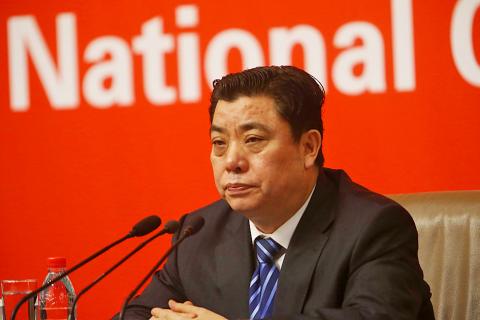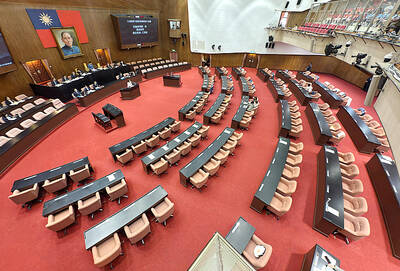China is using economic incentives to target 10 types of groups in Taiwan as part of its “united front” tactics, an unnamed government official said, citing national security intelligence.
The official said the groups targeted for engagement are local townships, young people and students, Chinese spouses of Taiwanese, Aborigines, pro-China political parties and groups, temples, descendants of Chinese who retain roots in China, labor groups, farmers’ and fishermens’ associations, and military veterans.
The government had previously estimated that China spends at least NT$10 billion (US$337.8 million) per year enticing Taiwanese to join united front efforts, but they believe that there might be more “invisible funding.”

Photo: CNA
China uses economic incentives when cultivating Chinese spouses, Aboriginal leaders, and local township and religious organizations, the official said, adding that Beijing might provide free visits to China or direct benefits to improve China’s approval rating.
China is also attempting to establish internal aid in Taiwan to direct public affairs and political activities, the official said.
Different levels of officials from China’s Taiwan Affairs Office (TAO), United Front Work Department (UFWD) of the Chinese Communist Party’s Central Committee and other groups have used Taiwan’s pro-unification groups and pro-China associations to arrange visits to Taiwan, gradually affecting exchanges using united front strategies, another unnamed source familiar with the matter said.
Trade groups, Chinese-funded firms and the local offices of Chinese businesses have members who also hold Chinese government positions, the source said, adding that these people cooperate with instructions from China.
During former president Ma Ying-jeou’s (馬英九) administration, Xiamen University’s Taiwan Research Institute and other Chinese think tanks researched Taiwan’s political and economic development and social sentiment for a long period in the name of academic cooperation and field research, the source said.
The organizations claimed that hotel costs were too high and rented homes in Taiwan for professors and students, the source said, adding that the groups used this opportunity to collect intelligence.
A suspected “price list” set by the TAO has emerged in a case involving New Party spokesman Wang Ping-chung (王炳忠), a national security official said.
Prosecutors have also found several million yuan in the accounts of other pro-China political parties and groups, the official said.
China has also hinted to political party members that if they gather military information in Taiwan, China would compensate them generously, while others have traveled to China to interact with national security officials and accept funds, the official added.
These cases are difficult to investigate, because it is not easy to prove that the money in those accounts was given by Chinese intelligence agencies or agencies involved with Taiwan, the official said.
Meanwhile, Chinese divisions involved with Taiwan are spread throughout several Chinese party, government and military divisions, including the UFWD, the Taiwan affairs system, think tanks and other divisions, the official said.
Taiwan has continuously tracked China’s attempts to influence Taiwanese politics and society, and has reacted appropriately, they added.

CROSS-STRAIT COLLABORATION: The new KMT chairwoman expressed interest in meeting the Chinese president from the start, but she’ll have to pay to get in Beijing allegedly agreed to let Chinese Nationalist Party (KMT) Chairwoman Cheng Li-wun (鄭麗文) meet with Chinese President Xi Jinping (習近平) around the Lunar New Year holiday next year on three conditions, including that the KMT block Taiwan’s arms purchases, a source said yesterday. Cheng has expressed interest in meeting Xi since she won the KMT’s chairmanship election in October. A source, speaking on condition of anonymity, said a consensus on a meeting was allegedly reached after two KMT vice chairmen visited China’s Taiwan Affairs Office Director Song Tao (宋濤) in China last month. Beijing allegedly gave the KMT three conditions it had to

‘BALANCE OF POWER’: Hegseth said that the US did not want to ‘strangle’ China, but to ensure that none of Washington’s allies would be vulnerable to military aggression Washington has no intention of changing the “status quo” in the Taiwan Strait, US Secretary of Defense Pete Hegseth said on Saturday, adding that one of the US military’s main priorities is to deter China “through strength, not through confrontation.” Speaking at the annual Reagan National Defense Forum in Simi Valley, California, Hegseth outlined the US Department of Defense’s priorities under US President Donald Trump. “First, defending the US homeland and our hemisphere. Second, deterring China through strength, not confrontation. Third, increased burden sharing for us, allies and partners. And fourth, supercharging the US defense industrial base,” he said. US-China relations under

The Chien Feng IV (勁蜂, Mighty Hornet) loitering munition is on track to enter flight tests next month in connection with potential adoption by Taiwanese and US armed forces, a government source said yesterday. The kamikaze drone, which boasts a range of 1,000km, debuted at the Taipei Aerospace and Defense Technology Exhibition in September, the official said on condition of anonymity. The Chungshan Institute of Science and Technology and US-based Kratos Defense jointly developed the platform by leveraging the engine and airframe of the latter’s MQM-178 Firejet target drone, they said. The uncrewed aerial vehicle is designed to utilize an artificial intelligence computer

The Chinese Nationalist Party (KMT) caucus yesterday decided to shelve proposed legislation that would give elected officials full control over their stipends, saying it would wait for a consensus to be reached before acting. KMT Legislator Chen Yu-jen (陳玉珍) last week proposed amendments to the Organic Act of the Legislative Yuan (立法院組織法) and the Regulations on Allowances for Elected Representatives and Subsidies for Village Chiefs (地方民意代表費用支給及村里長事務補助費補助條例), which would give legislators and councilors the freedom to use their allowances without providing invoices for reimbursement. The proposal immediately drew criticism, amid reports that several legislators face possible charges of embezzling fees intended to pay